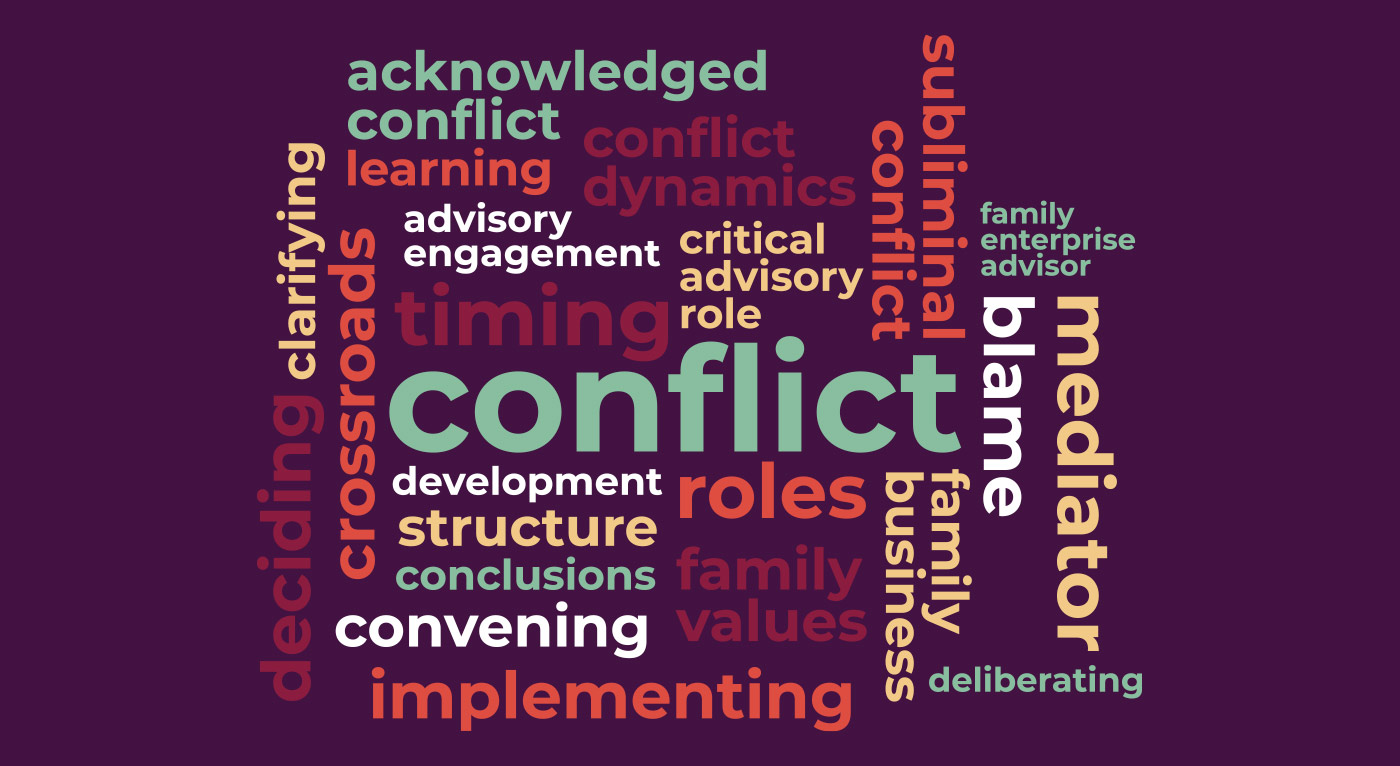
Open and acknowledged conflict may be easier to recognize but can be just as challenging to manage or resolve. Some forms of open conflict are met with significant resistance, or even blame, when an advisor probes. In larger family enterprises, it can be common for non-family stakeholders to open up on a confidential basis with an advisor, but then the advisor can be left holding secrets. So, where does the conflict really reside? And what can advisors do about it?
Reaching a Crossroads
When advisors experience these challenging dynamics in their work—if inquiring about the conflict is creating resistance, if blame is being apportioned, if they are left holding secrets, and if these dynamics are impeding progress on the agreed-upon work, it is time to consider bringing in a family business mediator—even though advisors may have some concerns about bringing in a third-party mediator, including “How will the mediator affect my role?” or “Will I lose my client?”
Timing of Mediation
In judging when it would be advantageous to bring a family business mediator into an engagement, here are a few questions for the advisor to consider:
- Do I know what this conflict is truly about? Is it acknowledged or subliminal?
- Can I help resolve this myself? What have I already tried? What results did that produce?
- What help might be necessary for my clients or for me?
- How will my role as their advisor change if I bring in a colleague?
- When is the right time to propose an additional professional, and how to do this sensitively?
- What resistance might I encounter, and what can I do about that?
- How long will a typical mediation take?
Addressing Family Enterprise Conflict with a Mediator
During an initial assessment, mediators will consider the individuals, the interdependent family business systems, their relationships with each other, and the fact that some individuals’ roles may occur in multiple systems. When it comes to conflict in a family enterprise, it is important that the mediator is as attentive to enduring relationships as he or she is to the task-focused business, legal, and financial issues.

Sorting out Roles
To avoid role confusion at the outset of the engagement, it is important to clarify the mediator’s function to all stakeholders. Separate and different from the family enterprise advisor’s role, the mediator’s role is primarily facilitative, even though a trained mediator with family business experience may have a relevant professional background. The family business advisor remains in the critical advisory role.
The mediator’s impartial facilitative role is to focus on helping the family to:
- think deeper and more clearly about the issues of conflict
- distinguish where the conflict(s) resides
- structure the process for creative problem solving,
- enable the clients to come to their own conclusions,
- conclude with action plans in keeping with the family values so that the family is better able to manage future conflict.
Observing the Mediation Process and Advancing Learning
When the family enterprise advisors can become a part of the process by sitting in on mediation sessions, they can become more aware of what works for their clients when it comes to conflict. Following the mediation intervention, the advisors can be more mindful of conflict triggers, able to remind their clients of any established ground rules, and provide reinforcement, if needed, of clients’ interests versus positions. Further, the advisor can help clients apply their learning and any agreements that emerged from the mediation intervention. Many options are available to the advisor and the mediator to structure these services in support of the client, including fee arrangements and collaborative coaching and briefing before, during, and after the mediation intervention.
Sidebar
Concluding the Mediation Process
A mediation intervention is intended as a finite process with a set of key steps:1
- Convening
- Clarifying
- Deliberating
- Deciding
- Implementing
- Learning
- Development
- “How do you want to feel about this issue or person by the end of mediation?”
- “What do you want to be thinking about this issue or person by the end of mediation?”
- “Do you feel ready and better equipped to move on and manage the future?”
- “What needs to happen next?”
What Next?
Family business mediation may reveal that further help is needed for some family members, such as counseling, coaching, or therapy. This conclusion does not need to impede the client family’s work with its advisor, as it is a separate activity. The family enterprise, with its original advisor, can continue the consultative journey, working through the more tangible issues for which the advisor was engaged but with better skills to manage future conflict.
Reference
1 Susskind, Larry, Sarah McKearnan, and Judith Thomas-Larmer, eds. The Consensus Building Handbook: A Comprehensive Guide to Reaching Agreement. SAGE Publications, 1999.






